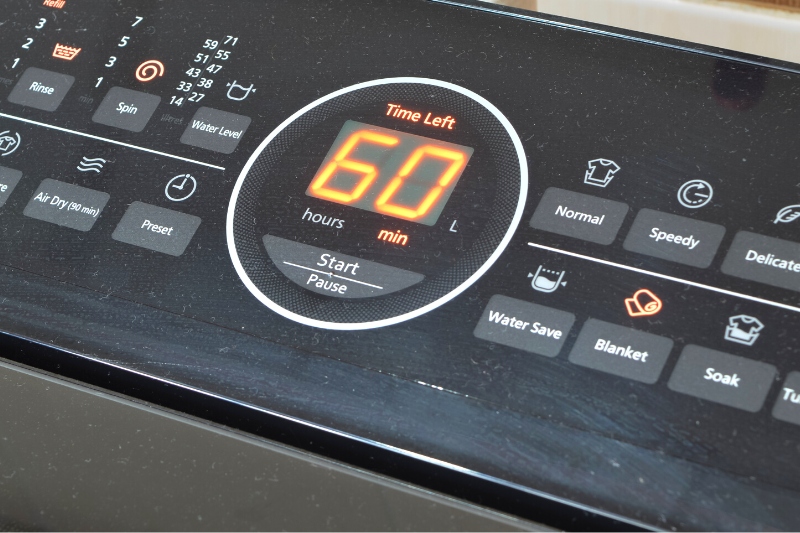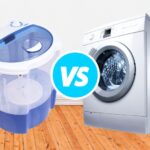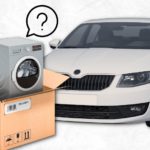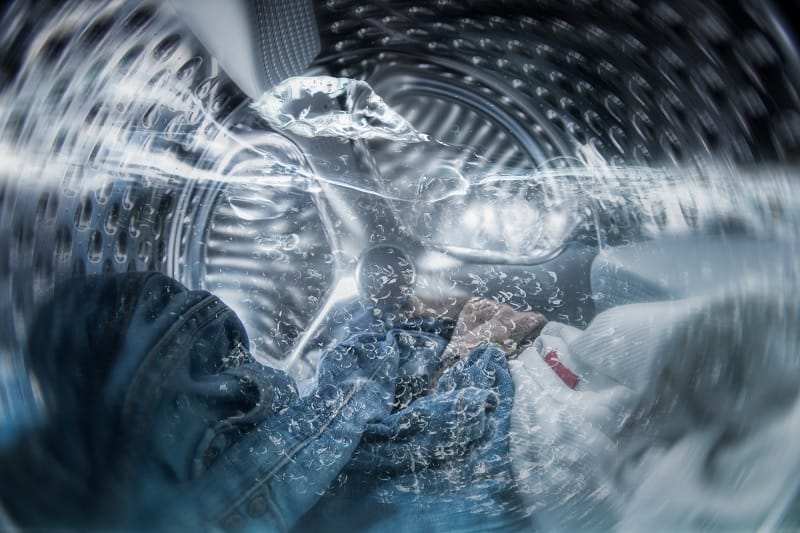Our home appliances constantly evolve, and many are now available in “high-efficiency” models.
Compared to traditional home appliances, these models are more energy efficient, function more effectively, and have significant environmental benefits.
The high-efficiency (HE) washing machine is one of the most talked about high-efficiency appliances, at least in the USA where this term originates.
Although this washer sounds fancy, what is a high-efficiency washing machine? How does it differ from a regular washing machine? And what criteria does the washing machine need to have to receive the HE seal of approval? Let’s find out.
What Are High-Efficiency Washing Machines?
“High-efficiency (HE) washing machines” is an American term used to describe modern washing machines that are more energy- and water-efficient than older machines.
They are available in various capacities and both front-loading and top-loading designs, but front-loaders are more common. This contrasts to how top-loaders have traditionally been more popular in the USA.
HE washing machines typically have built-in detergent dispensers and a range of cycle settings, including quick and handwash programs.
In Europe and the United Kingdom, specifically labelled high-efficiency (HE) washing machines don’t exist as a product. While you certainly can get washers that are more energy efficient and consume less water, they won’t be labelled as HE machines—we don’t have guidelines for this in the UK.
The appliance must meet specific water usage, energy efficiency, and detergent usage guidelines to be classed as a high-efficiency washing machine in the United States.
Therefore, one of the best ways to define a HE washing machine is to compare the appliance to a regular washer in relation to these three criteria.
What Is the Difference Between a HE Washer and a Regular Washer?
1. Water usage
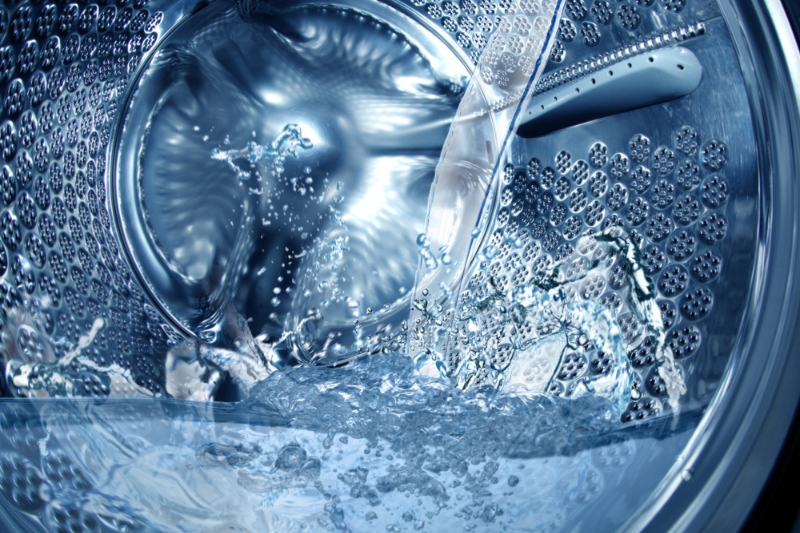
One of the key differentiators between a high-efficiency washing machine and a regular washer is water usage.
Traditional washing machines in the USA are top-loading, deep-fill machines that typically fill the entire drum with water regardless of how much laundry is in the appliance. This can be wasteful, especially if you’re washing smaller loads.
On the other hand, high-efficiency washing machines are designed to detect the size of your laundry load and adjust the water levels accordingly.
Less water is channelled into the drum for smaller washes, whereas more water is put into the drum for larger laundry loads.
Overall, these appliances use up to 80% less water than traditional, top-loading washers.
2. Energy efficiency
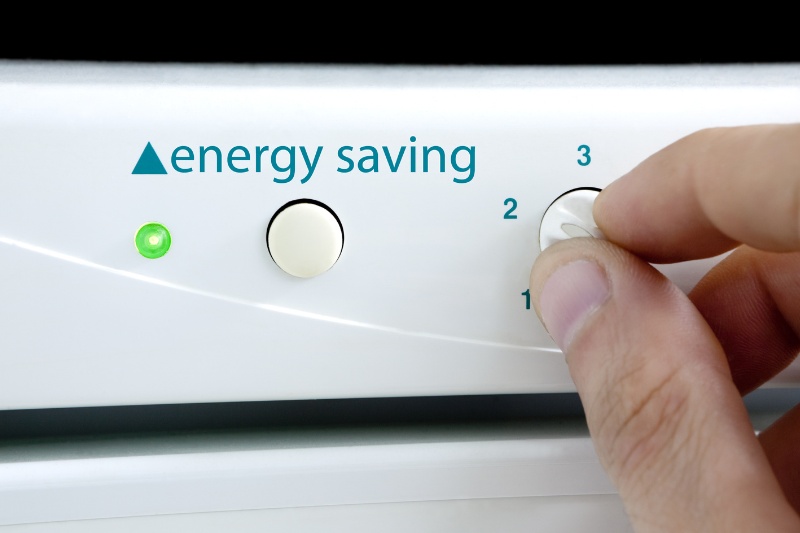
Energy consumption is a significant concern for many households today, both from a cost and environmental perspective.
Washing machines are one of the most frequently used appliances in our homes, and so your washer’s energy consumption can have a dramatic effect on your environmental impact and household bills.
Compared to traditional washers, high-efficiency washing machines are engineered to reduce energy usage.
Lower energy consumption is partially achieved through advanced features, such as variable speed settings powered by energy-efficient motors.
This reduces power consumption compared to regular washers.
Moreover, HE washers often come with specialised settings such as quick wash cycles and cold water options.
This allows you to save even more energy when washing lightly soiled clothes or garments that cannot withstand higher temperatures, as you’re not using excess energy to heat the water unnecessarily.
3. Detergent and laundry care
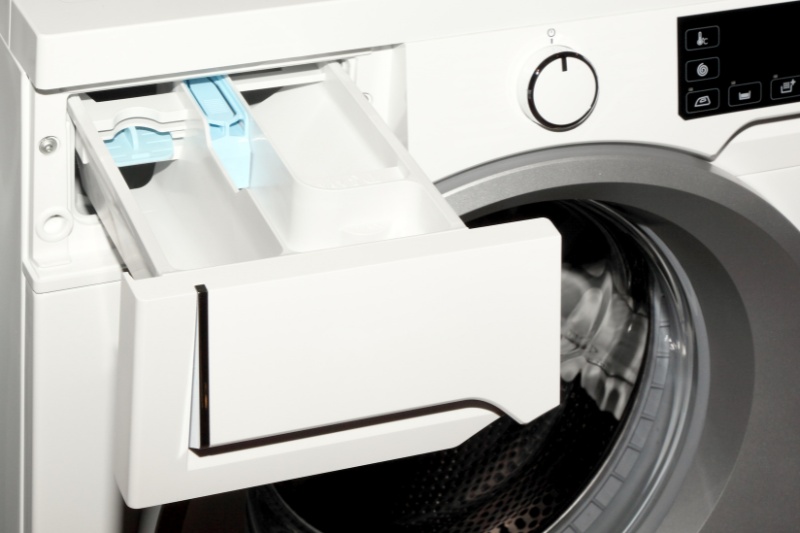
High-efficiency washing machines are more gentle on your clothes. Front-loading HE washers gently tumble clothes, whereas top-loading high-efficiency washers “bounce” your laundry gently around the machine.
In comparison, traditional top-loading washing machines have a central agitator that is less kind to your garments. This can cause damage, especially to delicate items.
Thanks to this cleaning motion and the fact that there is less water to dilute the soap, high-efficiency washers also require less detergent to achieve effective cleaning.
Regular detergent used in an HE washer can lead to excessive sudsing, potentially causing issues with the machine. To prevent this, it’s essential to use detergent specifically labelled for high-efficiency washers.
Additionally, many HE washers have built-in detergent dispensers that release the appropriate amount of detergent at the right time during the wash cycle. This ensures that clothes are thoroughly cleaned without any detergent residue left behind.
How Do High-Efficiency Washing Machines Work?
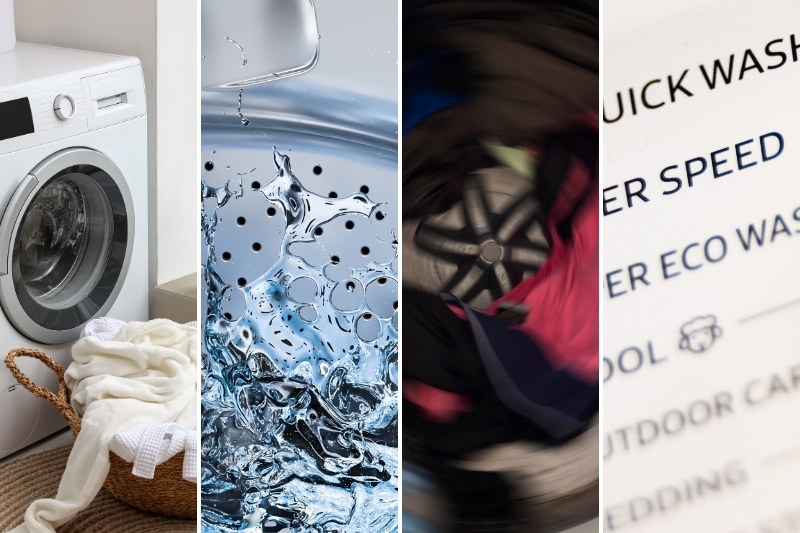
High-efficiency washing machines work by using precise water levels and a superior tumbling action that uses energy-efficient motors to conserve energy. Here is a closer look at how this works:
- Sense load size: After loading your clothes into the machine, high-efficiency washers use special sensors in the drum to detect the size of the load.
- Determine water level: Based on the load information, the washing machine calculates the precise amount of water required for the wash cycle. This helps to reduce water wastage while ensuring your clothes come out fresh and clean.
- Tumble clothes gently: Once the cycle starts, your clothes are washed using a gentle tumbling action. This motion is powered by energy-efficient motors rather than a central agitator, as found in traditional washing machines.
- Determine speed: HE washers also have variable speed settings and operate at lower speeds for lighter loads, contributing to energy savings.
On top of this intelligent design, HE washers tend to have more powerful spin cycles. This helps to remove excess water from your garments, leading to shorter drying times.
This may contribute to even more energy savings, as you won’t need to have your tumble dryer on as long.
How Do I Know If My Washer Is High Efficiency?
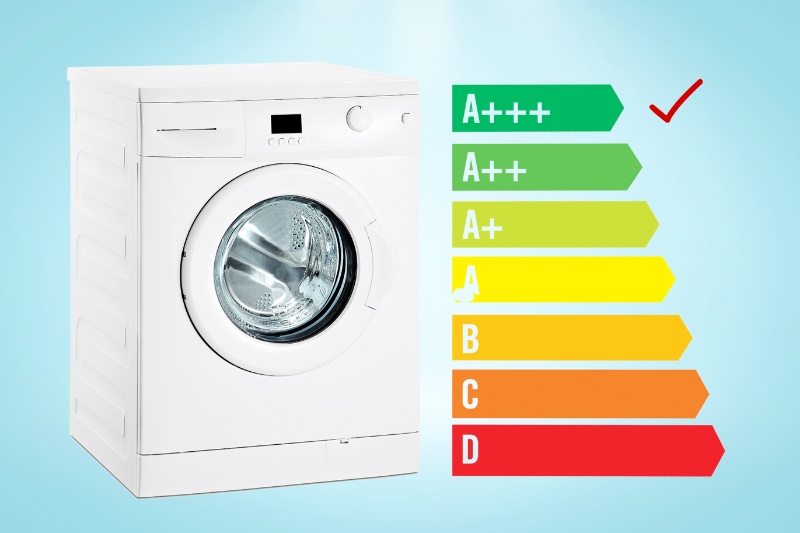
Identifying whether your washing machine is a high-efficiency model is relatively straightforward. Here are some indicators to look for:
- Label or markings: Manufacturers in the US label high-efficiency washing machines clearly with the “HE” logo on the control panel or somewhere visible on the appliance. Look for this symbol when purchasing a new washer. However, if you’re buying a washing machine in the UK, there won’t be a label—you’ll need to determine its efficiency in by looking at the water and energy usage instead.
- Water and energy usage: High-efficiency washing machines consume less water and energy than regular washers. If you are in the UK or Europe, check the energy label on your washer to see how much it consumes in kWh. You can also check the label scale. If your washer is a Class A (green) appliance, it will likely be a high-efficiency model.
- Drum design: Although you can get top-loading HE washers, most have a front-loading drum design. This sets them apart from traditional washers, which are all top loaders. Front-loading HE washers are more water-efficient and often have a higher spin speed to remove excess water from clothes, reducing drying time.
- Detergent type: As high-efficiency washers require special detergents, check the type of detergent recommended for your washing machine. If your washer requires HE detergent, it is a high-efficiency model. Note that as HE washers are standard in Europe, the requirement for special detergents might not be listed in the manuals for UK appliances.
What Are the Pros & Cons of a HE Washer?
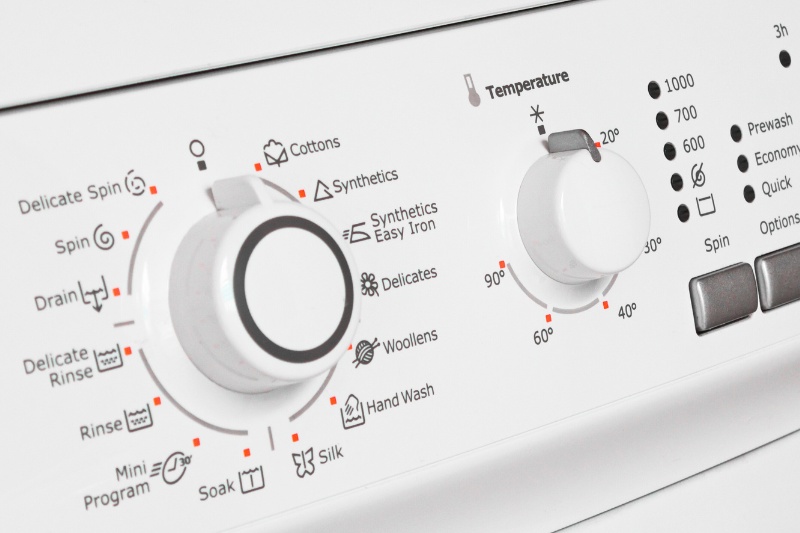
There are several advantages of using a high-efficiency washer, from obvious benefits like energy savings to less apparent perks like less damage to clothes. Here is a closer look:
- High-efficiency washing machines conserve and limit water usage, using the perfect amount for optimal cleaning without excess waste.
- The front-loading designs and gentle wash motions provide a more thorough clean, effectively removing dirt and stains from your garments.
- HE washers are gentler on your clothes, extending their lifespan. They can also handle more delicate fabrics unsuitable for washing in traditional machines.
- The faster spin cycles in high-efficiency washing machines remove more water from your clothes, leading to shorter drying times.
- Many HE washers have a variety of different cycles, including quick, delicate, and eco washes, catering to a wider variety of fabrics and washing preferences.
- By using less energy and water, high-efficiency washers are better for the environment and help you reduce your carbon footprint.
- You can wash clothes for less money per load in a high-efficiency washer, as you’re saving on both water and electricity costs.
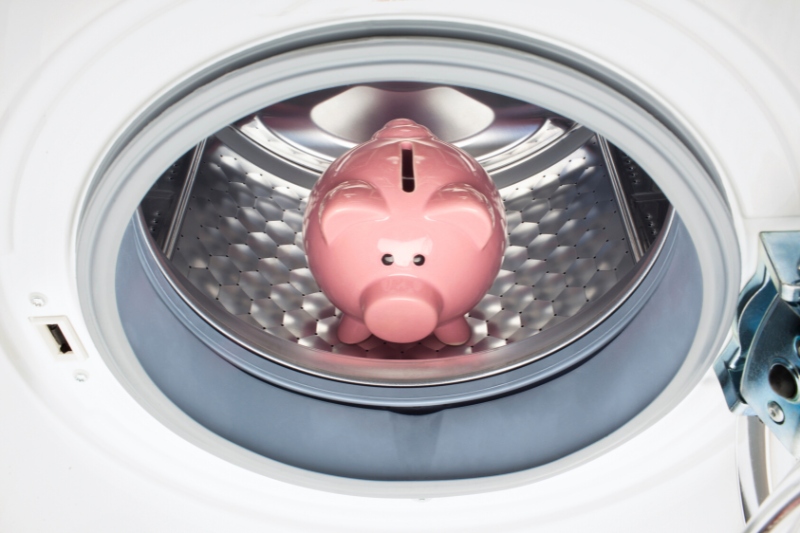
Despite these advantages, high-efficiency washers aren’t perfect. The main drawback is that HE washers are more expensive compared to traditional machines. However, energy and water savings will offset this upfront cost, meaning you’ll save money long-term.
Other disadvantages of HE washing machines are that they are only compatible with low-sudsing detergent, limiting your options, and that they can produce more noise/vibrations during their spin cycle.
Fortunately, many HE detergents are now available on the market, and proper installation can prevent noise.
Is a HE Washing Machine Better?
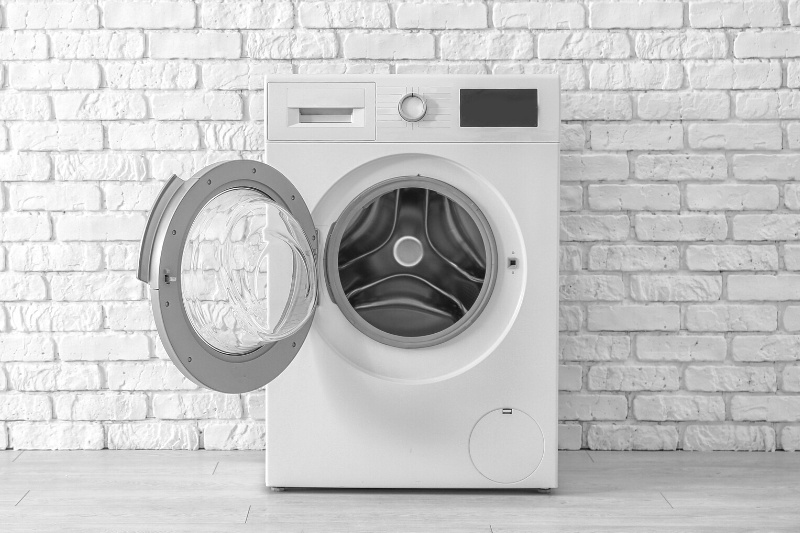
Whether a traditional washer or a HE appliance is better for you depends on personal preference. But if you can afford the larger upfront investment, we believe that the benefits of a high-efficiency washer outweigh the disadvantages.
They’re better for the planet, help you save money doing laundry, and take better care of your clothes—win, win, win!
If you’re reading in the UK, washing machines won’t have the HE high-efficiency symbol. See our guide to the most energy-efficient washing machines in the UK for some help choosing an ultra-efficient model.

Hannah has a passion for cleaning. She worked her way around Australia by cleaning hostels in exchange for free accommodation and used her cleaning skills to bag a job as a chalet host for a luxury ski company in France.
